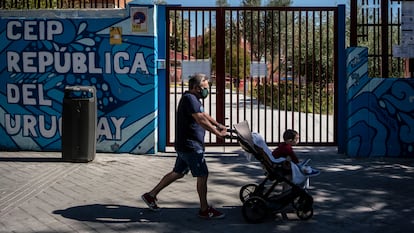First Madrid student tests positive for Covid-19: ‘The mother brought her in knowing she could have coronavirus’
Since schools reopened, 53 cases have been detected in educational centers across Spain, according to the education minister


It was the second day of school. “Until 3pm it had been a good day, everything had gone well,” remembers the principal of the República del Uruguay public school in Madrid, who preferred not to give his name. When he opened the doors of the school, which had been closed for nearly six months due to the coronavirus pandemic, he knew that sooner or later something could happen. The school is located in the southern district of Latina, very near Carabanchel, which is one of the areas hardest hit by the Covid-19 crisis in Madrid. The 14-day cumulative incidence of the virus in Carabanchel is at 779.5 cases per 100,000 inhabitants, significantly higher than the city’s average of 590.4 cases. On any given day, one of the 500 infant and primary school children, or the 30-something teachers at the center, could contract Covid-19. “What I wasn’t expecting is that it would happen so soon, nor was I expecting the tremendous irresponsibility of the parents,” he says.
“They [parents] have brought children to school with lice, with a fever, directly from the hospital… but I didn’t expect a mother to bring her daughter to school knowing that she was waiting for the results of a Covid-19 test and knowing that it could be positive. The mother was completely aware,” explains the principal, who has been in charge of what he describes as a “troubled” school for two years. He thought that by now he could no longer be surprised by parents' actions, but he was wrong.
On both days, the student’s temperature was taken, but she had “no symptoms at all”
According to the principal, when the mother came to pick up her daughter at 3pm, she did not tell him that her child had tested positive for Covid-19, but instead spoke to the cafeteria monitor. “She told her [the cafeteria monitor] that her daughter was not going to class the next day because she had just found out that she had the coronavirus,” he says.
When the school principal called the mother, he was shocked by what she said. The mother confessed that her daughter had been tested for Covid-19 because the girl had been living with positive cases. “How could you bring the girl to school in these circumstances?” he asked the mother. According to the principal, she replied: “Well we didn’t know for sure if she had it, it could have gone either way.”
The girl, whose grade won’t be revealed to protect her privacy and that of the other students affected, went to school on the first and second day of class with “complete normality.” On both days, her temperature was taken, but according to the principal, she had “no symptoms at all.”
No testing
The principal immediately called public health and inspection departments, as well as the head of DAT Sur, which oversees education matters in the school’s area. “According to the public health office, it wasn’t necessary to put the class in quarantine, given that our groups are in ‘bubbles,’ we meet all the regulations and it is a very isolated and controlled case.” But the department left it up to the principal to make the final call: “I made the decision, I quarantined the class,” he says.
The Covid-19 coordinator at the school was tasked with calling all the affected parents to explain the situation. Only 16 to 17 students are in each class and “many parents are not bringing their children out of fear,” says the principal. As for whether the classmates have also been tested, he replies: “We have given all their information to the public health department and that’s where our role ends.”
Two teachers at a school in Vallecas recently tested positve for Covid-19
A spokesperson for the Madrid health department said that the parents of the infected student’s classmates would be contacted and given an appointment to take their children to the doctor for a PCR test. But Nuria, the mother of one of the children affected, told the Spanish radio station Cadena SER that her child had not been tested for Covid-19 even though it’s stipulated in the protocol. “They just told us to stay at home and to notify them if the children have any compatible symptoms,” she said. Another parent confirmed that nobody had given them an appointment for a PCR test, either.
The school principal confirmed that the teacher of the girl’s class has not been told to quarantine or even been tested. “They [health services] say that since he was wearing a face mask at all times, and was washing his hands...,” he says, adding that he personally believes the teacher should be off work.
This is the first known case of a student with a confirmed coronavirus infection in Madrid since schools began to reopen last Friday. It comes after a primary school class at the French Lyceum was quarantined as a “preventive measure” due to a suspected coronavirus case; and news that a principal of a children’s school, as well as two teachers at a school in Vallecas, had tested positive for Covid-19. According to Spain’s Education Minister Isabel Celaá, 53 cases have been detected in 28,600 educational centers across the country.
The principal, who spoke to EL PAÍS at 8.30am on Thursday, as students were arriving at school, did not know how parents were going to react to the news. There are television cameras at the school gates, and he fears that tension will be running high. “When I spoke to a mother yesterday to tell her she had to bring her son to school or he would be marked absent, she asked me if I wanted to kill her child. So imagine what it might be like today.”
What does the protocol say
A close contact refers to any student who, two days before the infected individual began to experience symptoms and up until their isolation, was within two meters of them, without a face mask, for more than 15 minutes. In the case of children aged between six and 11, all students are considered close contacts regardless of whether they were wearing masks. With respect to teaching staff, the decision to quarantine is made on a case-by-case basis.
A student must quarantine for 14 days, starting from the last day of contact with the infected case, even if they test negative. A coronavirus outbreak at a school is defined as three or more related cases. If outbreaks are detected in several classrooms, or if there is a degree of “uncontrolled” transmission between different groups, an entire grade or the whole school could be closed.
English version by Melissa Kitson
Tu suscripción se está usando en otro dispositivo
¿Quieres añadir otro usuario a tu suscripción?
Si continúas leyendo en este dispositivo, no se podrá leer en el otro.
FlechaTu suscripción se está usando en otro dispositivo y solo puedes acceder a EL PAÍS desde un dispositivo a la vez.
Si quieres compartir tu cuenta, cambia tu suscripción a la modalidad Premium, así podrás añadir otro usuario. Cada uno accederá con su propia cuenta de email, lo que os permitirá personalizar vuestra experiencia en EL PAÍS.
¿Tienes una suscripción de empresa? Accede aquí para contratar más cuentas.
En el caso de no saber quién está usando tu cuenta, te recomendamos cambiar tu contraseña aquí.
Si decides continuar compartiendo tu cuenta, este mensaje se mostrará en tu dispositivo y en el de la otra persona que está usando tu cuenta de forma indefinida, afectando a tu experiencia de lectura. Puedes consultar aquí los términos y condiciones de la suscripción digital.








































